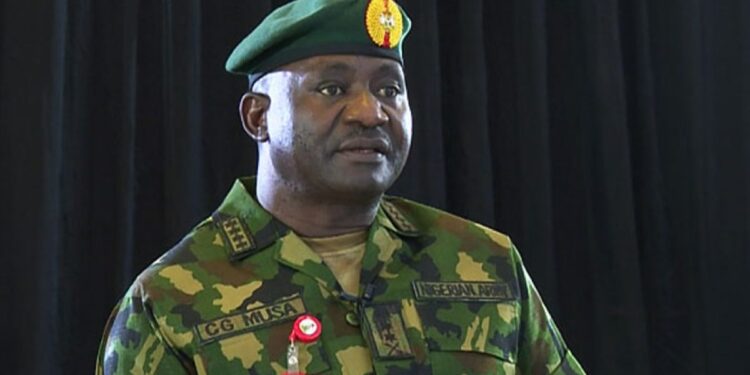When General Christopher Gwabin Musa took over as Nigeria’s Chief of Defence Staff (CDS), the country’s security environment was at a critical turning point. Years of insurgency, banditry, and political unrest had stretched the nation’s resilience and the military’s capacity. His appointment signaled not just a change in leadership, but the beginning of a new doctrine — one that emphasized strategy, responsibility, and humanity as pillars of national defence.
A Vision Beyond the Battlefield
General Musa combined the experience of a seasoned combat commander with the insight of a forward-thinking reformer. Having served in the North East Theatre, he realized early that Nigeria’s conflicts could not be resolved through military might alone. In his view, insecurity stemmed as much from governance shortcomings as from armed threats.
“The gun is only one part of the equation,” he told officers at the National Defence College. “When governance fails, insecurity fills the vacuum.”
This conviction shaped his tenure. He introduced a whole-of-society approach to national security, promoting collaboration between the government, civilians, and institutions as equal defenders of the nation. It marked a departure from hierarchical command structures to a more inclusive security philosophy.
Reshaping Defence Structures
Upon assuming office, Musa sought to integrate the Army, Navy, and Air Force under a unified strategic vision. His reforms enhanced coordination through the Joint Operations Center, ensuring shared intelligence and logistics across the services.
This laid the foundation for what analysts now describe as the Musa Doctrine of Integrated Command a system grounded in synergy, transparency, and accountability. Commanders were measured not only by operational success but also by ethics, troop welfare, and their relationship with civilians. This shift renewed professionalism within the Armed Forces and restored public confidence.
Merging Kinetic and Non-Kinetic Strategies
Musa viewed warfare as both physical and psychological. During his campaigns in the North East, he improved offensive capabilities while advancing humanitarian outreach, dialogue, and reintegration programs.
He often stated, “A gun can neutralize an enemy, but only compassion can stabilize a community.”
To counter Boko Haram’s ideological influence, he enlisted religious scholars and social scientists to promote narratives rooted in truth and faith, challenging extremist distortions. His focus on legitimacy over attrition transformed counterinsurgency into a battle of ideas as much as arms.
Guarding National Image and Morale
Musa also recognized that warfare extended into the information domain. He actively defended Nigeria’s reputation against biased global narratives, advocating for strategic communication to highlight military professionalism and transparency.
“If we don’t tell our story,” he warned, “someone else will — and they may not tell it kindly.”
Through regular briefings and fact-based engagement, he bolstered both public trust and troop morale.
Technology, Intelligence, and Innovation
Under Musa’s leadership, the Defence Intelligence Fusion Center (DIFC) became a model for cross-service intelligence collaboration. He fostered partnerships with universities and private firms to strengthen local defence technology, emphasizing that Nigeria must secure itself through homegrown innovation.
He also established the Defence Cyber Command to combat cyber threats and online radicalization, guiding Nigeria’s transition into hybrid warfare — where digital intelligence complements traditional defence.
The Human Element of Command
Despite his strategic discipline, General Musa was known for his empathy. He regularly visited frontline troops, listened to their concerns, and prioritized welfare reforms. Initiatives supporting veterans’ healthcare and scholarships for fallen soldiers’ children underscored his commitment to the military family.
His humility and compassion bridged the civil-military divide, inspiring trust and cooperation in post-conflict communities through education, dialogue, and reconstruction efforts.
Defence Diplomacy and Regional Leadership
Regionally, Musa revitalized Nigeria’s influence within ECOWAS, advocating for intelligence sharing and joint border security. He often reminded African counterparts that “Africa’s security is indivisible.” His diplomacy combined strength with tact, positioning Nigeria as a stabilizing power in the Sahel and Gulf of Guinea.
Legacy of a Strategic Visionary
General CG Musa’s leadership redefined Nigeria’s military purpose — shifting from reactive warfare to proactive nation-building. His focus on unity, accountability, and innovation established a template for modern security governance.
He fought extremism not only with force but with truth and moral clarity. He defended the national image with facts and integrity. And he proved that true security is sustained by justice, trust, and good governance.
In an era of misinformation, influence operations and global instability, General Musa stands as a strategic leader of the modern age, one who harmonizes power with principle, vision with compassion and command with humanity.
His legacy — like Nigeria itself — continues to evolve, shaped by resilience, reform, and an enduring belief in the Nigerian spirit.
📰 Originally published by DefenceTimesNG.africa







